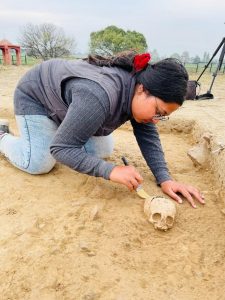








As an Early Career Woman in academia, it is often not just the research or the ambition that defines the path forward, but also the access to opportunities. Receiving support to attend WAC-10, my very first International Conference outside my country, is a deeply empowering moment in my academic journey; and that alone fills me with excitement, pride, and humility.
The financial assistance extended to me has opened the doors to incredible academic exposure, learning, and global connections that will shape my future.
This support is a vote of confidence in my work, in my voice, and in my potential. It allows me to share my research on a global platform, to learn from leading scholars from around the world, and to grow not just professionally but personally. It gives me the invaluable opportunity to engage in cross-cultural academic exchanges, and bring home insights that will help my work. It’s a chance to be visible, to learn, and to be heard.
To all the individuals who donated, supported, or simply believed in the importance of this initiative, thank you. Your kindness is creating ripples far beyond what you may see. You are enabling young women scholars like me, who may have the passion and capability but not always the means, to take our rightful place in international dialogues. Your generosity has given me and many others like me the confidence to step into the global academic community. I carry this opportunity with immense gratitude and responsibility.
A very special thanks to the patrons and organisers of WAC-10, who envisioned and made this support possible. It gives me hope that the future of our field will be more inclusive, more representative, and more humane.
With all my heart,
Sanya
Biography
Sanya Gupta (b. 1998) is a trained Archaeologist from Archaeological Survey of India (Batch of 2023), and has been honoured with 8 Gold Medals and one Book Prize in Post-Graduation from University of Lucknow in the academic year 2019-2021 for being First in the Faculty of Arts.
She holds a Bachelor’s degree in History from Banasthali Vidyapith (2016-2019), and a Postgraduate Diploma in Archaeology from the Archaeological Survey of India, Ministry of Culture, Government of India, where she received rigorous training in field methods, excavation techniques, and heritage documentation.
Having participated in multiple field excavations, she has worked on some of India’s most significant archaeological sites, including the iconic Harappan site of Rakhigarhi. Her core areas of interest lie in Field Archaeology and Historical Archaeology, with a particular passion for exploring civilisational continuities, cultural landscapes, and sacred geographies.
Currently, she is pursuing her PhD from University of Lucknow, and her topic allows her to combine textual scholarship with material evidence, and to contribute meaningfully to the understanding of one of the most enduring cultural and spiritual centres of the Indian subcontinent.
Her academic training under the Archaeological Survey of India, along with hands-on excavation experience, enables her to approach the past with both technical precision and interpretative depth. She believes in integrating science with storytelling to make archaeology accessible, relevant, and rooted in cultural respect.
“Archaeology, to me, is a profound act of cultural responsibility; it is the science of memory and the art of meaning-making. It is not merely about uncovering ancient objects, but about reviving the stories they carry, the questions they pose, and the wisdom they still offer. In a world that often forgets too quickly, archaeology insists on continuity, on truth, and on context. It bridges what was with what is, challenging us to rethink identity, belonging, and history itself. I believe that through every excavation, which is a dialogue between the past and the present, we don’t just rediscover civilisations, we redefine our own.”
Sanya envisions a future where archaeology plays a central role in shaping public consciousness, where heritage is protected through informed narratives, and where young scholars are empowered to dig deeper, both into the soil and into meaning.
